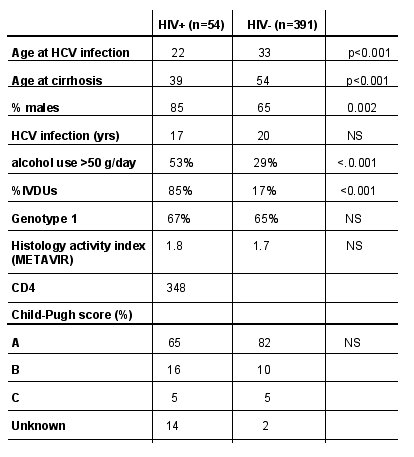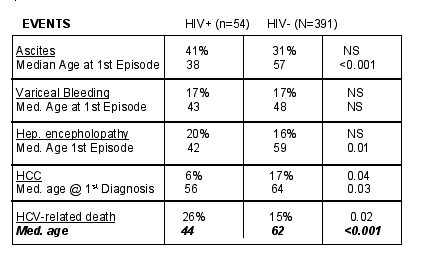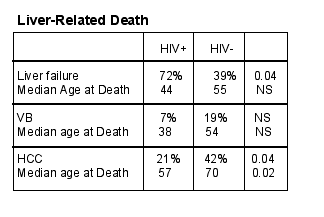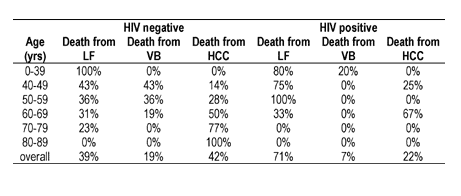 |
 |
 |
| |
Abstract 1095. IMPACT OF HIV COINFECTION ON THE AGE AND THE CAUSE OF DEATH IN
PATIENTS WITH HCV CIRRHOSIS
Reported by Jules Levin
|
| |
| |
see NATAP website for more AASLD coverage www.natap.org
This study from French research group finds HCV/HIV coinfected patients
progress more quickly than patients infected with HCV alone after developing
cirrhosis and first cirhosis-related complication. Authors report from this
study that coinfected patients have dramatic increase in "mortality" compared
to patients with HCV alone. HCV-related death occured more quickly in
coinfected patients (44 yrs of age vs 62), although they were younger at
HCV-infection. The limitations of this study, as I see it, are as follows.
HIV viral load and information related to HIV treatment is not reported at
all in this presentation at AASLD (for example, how many patients had
undetectable HIV-RNA; how many patients were taking a protease inhibitor).
The HIV+ patient group had significantly more males, more alcohol
consumption, more IVDUs
Di Martino as background said 50% of patients with HCV alone progress in 30
years from F0 to F4 (cirrhosis), and progression is a function of a number of
factors such as age, gender, etc. One a patient reaches F4 mortality occurs
at 5% per year as cancer and other complications can occur. The specific
impact of HIV coinfection on the cause of liver related death remains to be
investigated. The purpose of this study is to characterize the age & cause of
HCV-related death in patients with HCV cirrhosis with or without HIV
coinfection.
The study looked at 445 patients with HCV cirrhosis, without HBV nor HDV,
consecutively seen at Hopital Pitie-Salpetriere between 1998-2001. 54
patients were coinfected. 95 had decompensated cirrhosis at first evaluation.
Median follow-up duration was 34 months (range 1 yr to 17 years).
Baseline Characteristics
|
|
| |
 |
|
| |
This was a retrospective cohort study. Causes of death were as follows:
--non liver-related death (N=6, including 1 case of AIDS)
--HCCancer (n=27)
--Variceal bleeding (VB) N=12
--liver failure (n=32), excluding OIs or infections associated with CD4<200
|
|
| |
 |
|
| |
 |
|
| |
Impact of HIV coinfection on survival after the first cirrhosis-related
complication:
--HIV+ positive have "dramatic" increase in mortality. After 1 year mortality
was 35% vs 17%, after 2 yrs 52% vs 27%, 67% at 5 yrs vs 47%.
--RR of coinfected patients was 2.19 (p<0.02) and similar to the impact of
Child-Pugh score C (2.23)
Summary by Authors
- although younger at HCV infection, cirrhosis and cirrhosis related
complications occurred 10 years earlier in coinfected patients than in HCV
alone. The difference was significant for ascites, encepholopsthy and HCC
- In HCV/HIV the delay between the 1st complication and death was shorter,
independentlyof the Child-Pugh score, gender, age, alcohol consumption, and
type of 1st complication.
- Liver failure, in HCV/HIV, was the main cause of death
- There was a lower prevalence of HCC and HCC-related death
- In coinfection 80% of patients died before age 60; 65% before age 5. IN
HCV alone half of patients died before age 60
- Di Martino concluded liver transplantation should be discussed as soon as the first cirrhosis related complication occurs in HCv/HIV coinfected patients
because of their low survival.
- The decision for liver transplantation should be favorably influenced by
their young age and the low probability of HCC developing.
program abstract:
Vincent Di Martino, Lucas Cavallaro, Joel Ezenfis, Marie-Helene Tainturier,
Yves Benhamou, Marie Bochet, Christine Katlama, Thierry Poynard, Multivirc
Group, GH Pitie-Salpetriere, Paris France
Background/Aim: Long-term follow-up observation of patients with HCV-related
cirrhosis is of considerable help for validating modeling of the natural
history of hepatitis C and pharmaco-economic studies. HIV coinfection was
shown to worsen the course of chronic hepatitis C but whether HIV may impact
on the causes of liver-related death has never been investigated.
The aim was to assess the relationship between age and cause of death in
HCV-related cirrhotic patients according to the HIV coinfection.
Patients and methods: 445 patients with histologically proven HCV cirrhosis
had been consecutively seen between 1988 and 2001 and were followed for a
median duration of 34 months (range:1-206 months). 54 were HIV positive. 95
had decompensated HCV cirrhosis at the time of liver biopsy. 261 received at
least 3 months of anti-HCV therapy during follow-up. The occurrence of the
following complications was recorded: liver failure without HCC (LF),
variceal bleeding (VB), hepatocellular carcinoma (HCC). Causes of death were
recorded and classified as follows: non liver-related death, death from LF
without HCC, death from VB without HCC and death from HCC. Statistical
analyses were performed using chi-square and Kruskall Wallis rank tests.
Results: Complications occurred during follow-up in 191 patients (23 HIV
positive): LF in 157 cases (22 HIV positive), VB in 74 cases (9 HIV
positive), and HCC in 64 cases (3 HIV positive). The prevalence of HCC was
lower in HIV positive patients than in HIV negative patients (5.5% vs 15.6%,
p=0.04). Death related to cirrhosis was observed in 71 cases (14 HIV
positive). It represented 90% and 93% of the overall mortality in HIV
negative and HIV positive patients, respectively (only one case of
AIDS-related death). Causes of death were related to age. Before 60 years
death was related to LF in 60%, to VB in 24% and to HCC in 16%. After 60
years, death was related to HCC in 64%, to LF in 27% and to VB in 3%.
HIV positive patients died earlier (median: 46 vs 62 years, p=0.002) and more
often from LF (71% vs 39%, p=0.03) than from HCC or VB comparatively to HIV
negative patients. When adjusted on the age these differences disappeared
|
|
| |
 |
|
| |
Conclusion: In the course of HCV cirrhosis, the cause of liver-related death
differs according to age. Because HIV positive patients got cirrhosis
earlier, they die earlier and more often from liver failure, suggesting that
HCV treatment should be initiated as soon as possible and liver
transplantation discussed in non responders.
|
|
| |
|
 |
 |
|
|